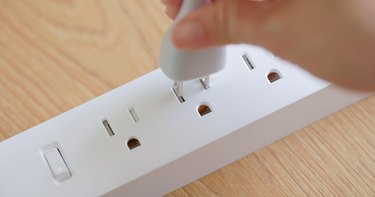
There's no doubting the importance of conserving energy to save money on electric bills and to help preserve the environment. When some appliances are left plugged in, they consume energy unnecessarily, but what about an appliance extension cord or a medium-duty extension cord? Knowing the different types of extension cords can help you understand what they do and whether they consume electricity just by being plugged in. That way, you know which you need to remove to reduce your carbon footprint and save a little cash at the same time.
Does a Medium-Duty Extension Cord Waste Energy?
Video of the Day
Medium-duty extension cords are the ones you're most likely to have lying around your utility closet in your home. They're typically used indoors for all types of jobs. You can buy them as two-prong, multiplug extension cords or as more versatile three-prong cords.
Video of the Day
An extension cord of this kind does not consume electricity when plugged in. The reason is that this kind of tool merely conducts electricity from the wall or other source to whatever is plugged into it. By itself, it does not and cannot consume units of power.
If anything is plugged into the extension cord, it may be using electricity. There are many everyday household items that use electricity when they are powered off but still plugged in, whether directly to the wall or through an extension cord. These include chargers; coffee makers; computers; lamps; major appliances, such as a washer and dryer and oven or stovetop; printers; televisions; toasters and video game systems.
Other Types of Extension Cords
There are several different types of extension cords. Like medium-duty extension cords, most do not consume energy by themselves. Even larger, heavier-duty cords, such as an extension cord for 20 amps, won't use electricity when plugged in by themselves, though some notable exceptions exist.
You can buy a special appliance extension cord to work with minor and more major appliances that by themselves do not consume any additional electricity. If they are not attached to a machine, they won't rack up your electric bill, but these extension cords can use energy in another way. The longer the extension cord, the more power it takes to run to the appliance. An appliance plugged in using an extension cord will use more electricity than if it was just plugged into the wall. For small items, this increase is negligible, but it will add up over time for more significant things.
Like indoor extension cords, outdoor extension cords do not consume electricity when plugged in and are not attached to an appliance of some kind. That being said, you shouldn't leave outdoor extension cords plugged in, even the waterproof type. Over time, they will break down when exposed to the elements. Eventually, this wear and tear could end up sparking a fire or an electrical short.
Extension Cords With Switches
You can buy an extension cord with a switch that turns it on or off. It's very common to find power strips with these switches. The benefit is that you're completely cutting the power to everything plugged into them by using them. You won't need to unplug anything from the wall that may be wasting electricity.
Experts recommend using these kinds of power strips or extension cords if you're away from home for an extended period. For example, you can save a considerable amount of money in your vacation home if you cut the power to appliances while you're not there.